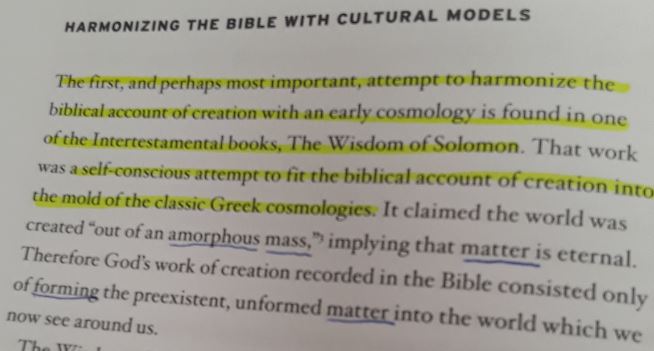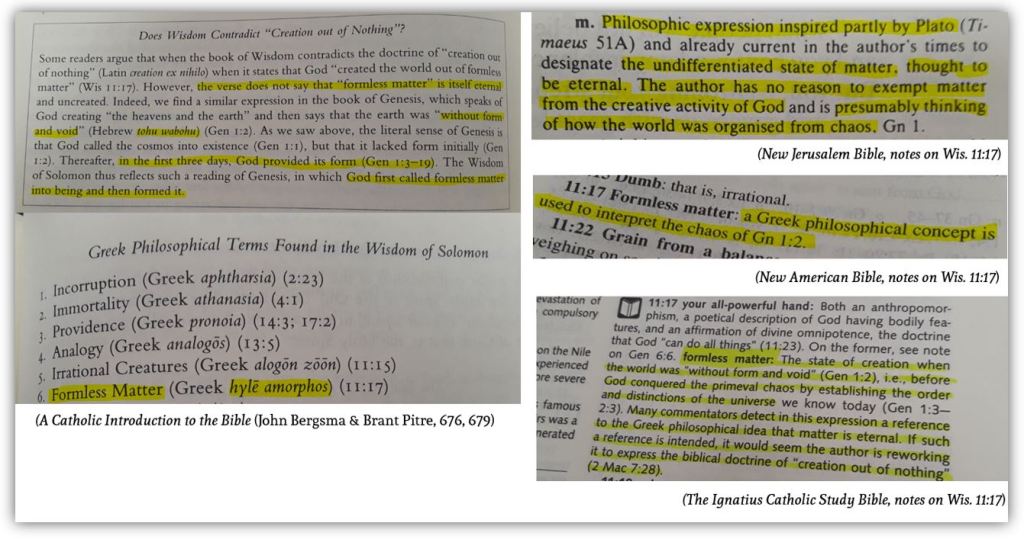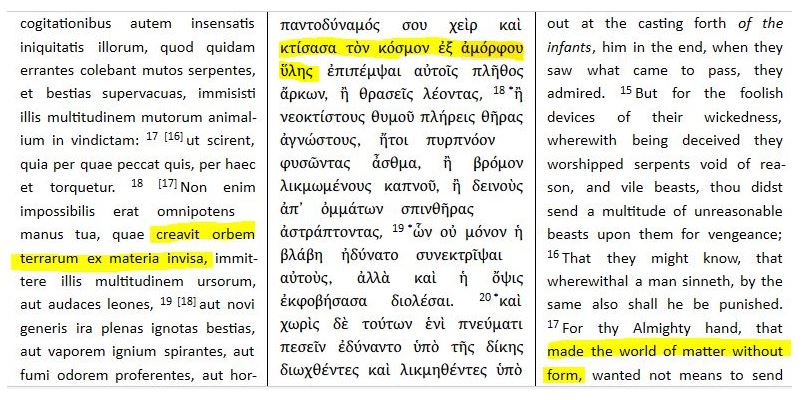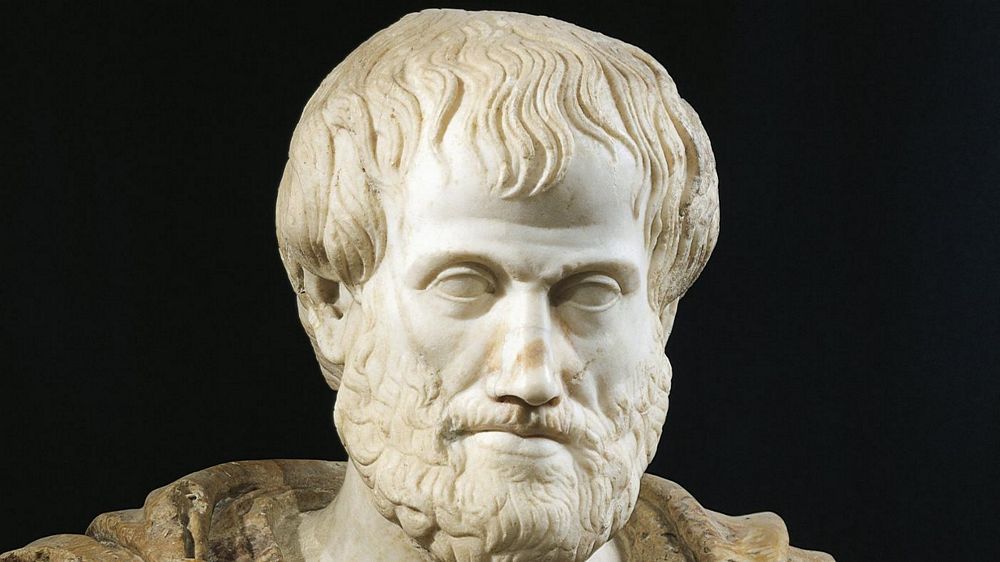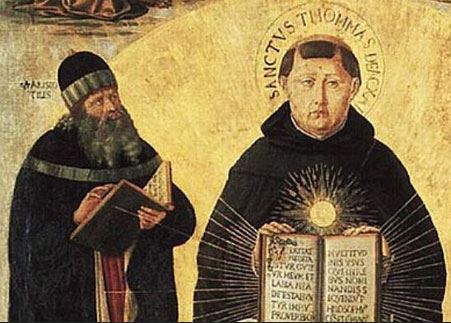
“I beseech you, my child, to look at the heaven and the earth and see everything that is in them, and recognize that God did not make them out of things that existed.”
(2 Maccabees 7:28)
Genesis Unbound
In a fascinating modern book on the biblical creation story (Genesis Unbound), Evangelical Bible scholar John Sailhamer understands a passage from the Book of Wisdom (aka, The Wisdom of Solomon) as “a self-conscious attempt to fit the biblical account of creation into the mold of classic Greek cosmologies,” and then blamed it for centuries of pagan influence. He believes this to be the case because Wisdom “claimed the world was created ‘out of an amorphous mass,’ [ek amorphou uleis] implying that matter is eternal” (Genesis Unbound, 184, see fn. 19.3).
Sailhamer finds this problematic because New Testament writers taught that, “the world was created out of nothing (ex nihilo)” (e.g., Heb. 11:3; Jn. 1:3). Although he admits that, “the Church consistently rejected the idea that God created the world out of preexisting, unformed matter,” he asserts that the Church nevertheless, “consistently retained the idea that the world was once a formless mass of chaos” (Genesis Unbound, 184).
What does the Church actually teach on this subject, and how does it handle Wisdom 11:17?
The Church on Creation
Both Scripture and the Church are quite clear that God created the natural universe out of / from nothing. God alone preexisted creation (e.g., 2 Mac. 7:28; Heb. 11:3; Jn. 1:3; CCC 296-298). Since the Wisdom of Solomon is part of the Church’s canonical Scriptures, this verse must be explained in that light.
From what I have seen, the most popular explanation of the passage is that it is referring to the initial chaotic state of God’s creation in Genesis 1:2 (“The earth was without form and void, and darkness was over the face of the deep”) – not to God’s act of creation in Genesis 1:1 (“In the beginning, God created the heavens and the earth”).
At the same time, however, many important sources admit that the phrase is borrowing from classic Greek terminology, and attribute such terms to pagan beliefs about the creation of the universe.
While the stated facts may be accurate, I do not think we must commit ourselves to such an understanding. This is because the terminology may not necessarily be referring to pagan Greek mythology but rather to classic Greek philosophy. If so, another interpretation emerges that in no way challenges the Church’s understanding of creation – and also respects the cultural milieu in which Wisdom was written.
Wisdom 11:17
Let’s begin with what the scriptural text says.
Various translations of the phrase in question exist:
- RSV / ESV: “created the world out of formless matter”
- NAB: “fashioned the universe from formless matter”
- NJB: “created the world from formless matter”
Translation Analysis
“Create” seems a better fit for the Greek (“ktidzo“) than “fashion” which implies preexisting materials. (This may be the NAB’s attempt to reconcile the text with its view that this verse is an interpretation of Gen. 1:2 instead of Gen. 1:1).

“Out of” or “From” is debatable. The Greek “ek/ex” has a wide range of nuanced meanings that all center on origin – but “out of” seems to imply preexistence while “from” does not. (Oddly, the NAB translates the same word as “out of” in 2 Maccabees 7:28 – a passage with exactly the same context!)
“Formless matter” is a good translation of “amorphous” and “hyle.” The word “morphe” originally meant shape or appearance and “hyle” primarily referred to trees/wood but was used generically for the material or the stuff from which something is made. More on these two important terms below.
Classic Greek
Despite their current English usage that might lend credence to Sailhamer’s complaint, long before The Wisdom of Solomon was written, these words took on important philosophical definitions.
- Hyle: “Matter” in the Greek philosophical tradition does not (despite many explanatory examples) refer to “stuff.” Rather, it is that which takes on form (see below) resulting in the existence of a individual substance.
- Morphe: “Form” does not (again, despite many explanatory examples) refer to “shape.” Rather, it is that which informs matter (see above) resulting in the existence of a individual substance.
If this “sounds like Greek” to you, it should! These are not English terms!
Those lacking a classical Greek philosophical understanding of “form” and “matter” might easily picture God grabbing some “stuff” and “shaping” it into the universe – but that is not how Aristotle or St. Thomas Aquinas would have read those words.
Aristotle on Form and Matter
Form and Matter are metaphysical principles of all created things. When form and matter are conjoined together, they form an existing thing (a substance). Form is what makes something what it is, and matter accounts for multiple instances of given forms. So for example, a cow is a cow due to its form (“cowness”?) but each individual cow exists because “cowness” informs different matter.
Form and matter are not, however, “parts” of things. You don’t have “stuff” called matter just hanging out waiting for form to come along shape it into something! Instead, they are principles which explain how things change (I won’t go into that here – but if you’re interested, THIS is a good introduction to the concepts).
Another way to look at the Greek concept of form and matter is to say that matter is just the possibility of a substance coming into existence and form is what makes that possibility a reality.
Aquinas on Form and Matter
Aquinas basically took Aristotle’s philosophy and applied it to Christian theology. Thomistic theology is Aristotelian in nature (philosopher pun). So, for example, when Aquinas defined the change of the bread into the body and blood of Christ in the Eucharist, he called it “Transubstantiation” – the change (trans) of substance. In order to understand the Church, one must often understand Aristotle.
When Aquinas writes on creation in his Summa Theologiae, he describes it in Aristotelian philosophical terminology. In fact, the first article he treats in that section is “Whether formlessness of created matter preceded in time its formation?”
St. Thomas’s answer is:
“We must assert that primary matter was not created altogether formless, nor under any one common form, but under distinct forms. And so, if the formlessness of matter be taken as referring to the condition of primary matter, which in itself is formless, this formlessness did not precede in time its formation or distinction, but only in origin and nature.
(ST I Q.66 A.1)
It’s not important that you understand the above quote. The important thing to note is how steeped the Church’s greatest theologian was in Aristotelian categories of thought.
Formless Matter
If matter and form do not exist as substances apart from one another, are they even real? Forms have been equated with ideas (with regard to creation, in God’s mind) and something called “prime matter” is referred to when speaking of form and matter as distinct principles “prior” to their conjoining.
What is interesting about prime matter is that while it is in a sense “real” – it doesn’t exist. It is only the potential for existence that becomes real existence when it is informed. “Pure potential,” then, on an Aristotelian/Thomistic understanding is literally nothing!
Creation Ex Materia or Ex Nihilo?
Combining all these classic Greek philosophical terms and ideas, the following may account for the meaning of Wisdom 11:17 that neither capitulates to the pagan idea of creation from eternal preexisting matter nor simply relegates it to a gloss on Genesis 1:2 (the Church’s more popular understanding from what I have seen).
On a classic Greek Aristotelian/Thomistic understanding, God “creating the world from formless matter” could mean that God conjoined forms (His ideas) to prime matter in the very act of creating all the natural substances of the universe. Since the classic Greek understanding, “formless matter” is – literally – nothing, then to say that God created the universe out of formless matter is the same as saying he created the world out of nothing (= creatio ex nihilo).
While the Greek does not demand such a reading, nothing in it makes such a reading inadmissible.
Conclusion
There is a lot more than can be said about this manner of speaking of “form” and “matter,” but the point here is simply that even if Wisdom 11:17 is an “attempt to fit the biblical account of creation into the mold of classic Greek” – that doesn’t prove that it means that “God created the world out of preexisting, unformed matter.”
Indeed, “preexisting formless matter” would be a contradiction in terms.
